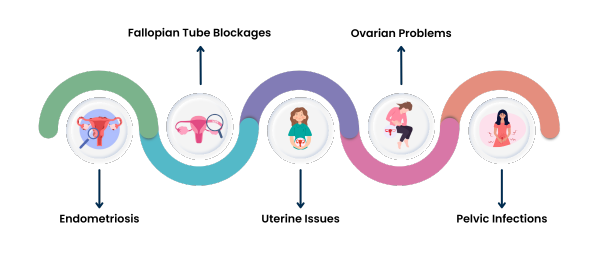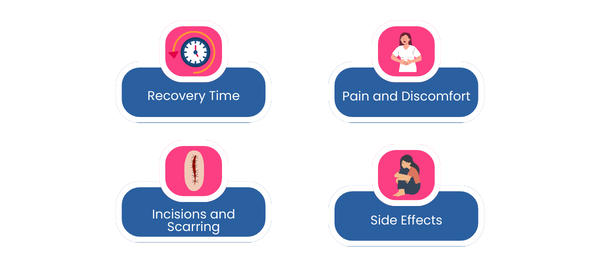What is Laparoscopy?
Laparoscopy is a minimally invasive procedure where a small camera, called a laparoscope, is inserted through a tiny incision near the belly button. This allows doctors to view the organs inside the abdomen and pelvis, such as the ovaries, fallopian tubes, and uterus, without large cuts. It is performed under general anesthesia and offers quicker recovery than traditional surgery.
How Laparoscopy Helps Diagnose Infertility

Laparoscopy is essential in diagnosing infertility, especially when other tests don’t provide clear answers:
• Endometriosis: Laparoscopy helps detect endometriosis, where tissue similar to the uterine lining grows outside the uterus. It can also be treated during the procedure.
• Fallopian Tube Blockages: It can identify blocked or damaged fallopian tubes, which can be treated surgically during the procedure.
• Uterine Issues: Conditions like fibroids or polyps can affect fertility, and laparoscopy helps diagnose and treat these problems.
• Ovarian Problems: It can identify and remove ovarian cysts or other abnormalities that may affect fertility.
• Pelvic Infections: Laparoscopy can detect and treat pelvic infections that cause infertility.
Treating Endometriosis with Laparoscopy
Endometriosis is a condition where tissue similar to the lining of the uterus grows outside the uterus, causing pain, inflammation, and sometimes infertility. It can affect the ovaries, fallopian tubes, and the surrounding pelvic tissue, which can obstruct the normal functioning of the reproductive organs, leading to difficulty in conceiving.
How Laparoscopy Helps:
Laparoscopy is considered the gold standard for diagnosing and treating endometriosis. It allows doctors to identify the extent and severity of the condition by providing a clear view of the pelvic organs. During laparoscopy, the surgeon can remove or destroy the endometrial tissue using specialized tools, improving the chances of conception.
• Diagnosis: The camera inserted during laparoscopy enables the fertility specialist to confirm the presence of endometriosis, which can sometimes be difficult to diagnose through other methods.
• Treatment: In addition to diagnosis, laparoscopy allows for the removal of endometrial implants or adhesions that can block the fallopian tubes or distort the ovaries. This reduces inflammation and improves the chances of natural conception or success with assisted reproductive technologies like IVF.
Laparoscopy can significantly enhance the chances of pregnancy for women suffering from endometriosis by improving the environment for the eggs and sperm to meet, making it a vital part of infertility treatment.
Laparoscopy for Ovarian Cysts
Ovarian cysts are fluid-filled sacs that develop on or within the ovaries. While most cysts are benign and do not affect fertility, some can cause problems, including pain, hormonal imbalances, and blockage of the fallopian tubes. Cysts that are large, persistent, or cause symptoms may interfere with ovulation or even damage ovarian tissue, making conception difficult.
How Laparoscopy Helps:
Laparoscopy can be an effective way to treat ovarian cysts, especially when other treatment options have not been successful. The procedure allows the fertility specialist to remove the cyst or drain it without the need for a large incision, minimizing recovery time and potential complications.
• Cyst Removal: In many cases, laparoscopy is used to remove the cyst while preserving healthy ovarian tissue. This is crucial for maintaining the ovaries’ ability to function properly and produce eggs for conception.
• Cyst Drainage: If the cyst is small or fluid-filled, it may be drained during laparoscopy to relieve pain and improve fertility.
• Minimally Invasive: Unlike traditional open surgery, laparoscopy requires only small incisions, leading to less trauma, faster recovery, and a lower risk of complications. This makes it a preferred option for treating ovarian cysts in women who are trying to conceive.
Related content- Fallopian Tube Blockage Treatment & How it is Cause?
Unblocking Fallopian Tubes with Laparoscopy
Blocked fallopian tubes are one of the leading causes of infertility, as they prevent the egg from traveling from the ovaries to the uterus for fertilization. This blockage can occur due to infections, adhesions, or conditions like endometriosis, making natural conception difficult.
Laparoscopy is an effective treatment option for identifying and treating blockages in the fallopian tubes. During the procedure, a surgeon can use a laparoscope to locate any obstructions. If a blockage is found, it can often be cleared, or tubal surgery can be performed to restore the tubes’ function. By unblocking the fallopian tubes, laparoscopy can significantly improve the chances of a natural pregnancy and may also benefit women undergoing assisted reproductive techniques like IVF.
For those dealing with blocked fallopian tubes, seeking the guidance of the Best IVF Doctors in Vizag can provide personalized treatment options, including laparoscopic surgery, to improve fertility outcomes and increase the chances of conception.
Benefits of Laparoscopy in Fertility Treatment
Laparoscopy offers several advantages in the treatment of infertility, making it an important part of the fertility journey:
• Minimally Invasive: Unlike traditional open surgery, laparoscopy requires only small incisions, which reduces the risk of infection, scarring, and the need for long recovery times. This makes it a safer and more comfortable option for women seeking fertility treatment.
• Accurate Diagnosis: Laparoscopy enables fertility specialists to directly view the reproductive organs. It can identify conditions like endometriosis, pelvic adhesions, fibroids, and ovarian cysts, all of which can impact fertility. By diagnosing these conditions early, laparoscopy helps guide the treatment plan.
• Treatment of Multiple Conditions: Not only can laparoscopy identify fertility issues, but it can also be used to treat them simultaneously. For example, if endometriosis or adhesions are found, the surgeon can remove them during the same procedure, improving the chances of conception.
• Improved Fertility Outcomes: By addressing and treating underlying fertility issues, laparoscopy often leads to improved fertility outcomes. Many women who undergo laparoscopy for tubal blockages or endometriosis find that they are more likely to conceive naturally or have a higher success rate with IVF.
• Quick Recovery: Since laparoscopy involves smaller incisions, patients typically experience less pain and a faster recovery time than with traditional surgery. Most women can return to their daily activities within a few days, making it a more convenient option.
What to Expect After Laparoscopy in Infertility Treatment

After a laparoscopy, recovery is generally quick and manageable. Here’s what to expect:
1. Recovery Time: You’ll likely rest in a recovery room for a few hours before going home the same day. Most women resume normal activities within 1-2 days, though rest is important for the first 48 hours.
2. Pain and Discomfort: Mild cramping and gas-related pain in the abdomen or shoulders are common but should subside within a few days. Over-the-counter pain relievers can help.
3. Incisions and Scarring: The small incisions typically heal well and leave minimal scarring. Keeping the area clean is important for preventing infection.
4. Side Effects: Mild bloating, nausea, or vaginal spotting may occur but usually resolve within a few days.
Laparoscopy plays a crucial role in diagnosing and treating various infertility issues. By providing a minimally invasive approach, it allows fertility specialists to directly observe the reproductive organs, identify conditions like endometriosis, blocked fallopian tubes, ovarian cysts, or fibroids, and address them effectively. This procedure not only enhances the chances of conception but also helps in improving overall fertility health.
In conclusion, laparoscopy can be an essential tool in infertility treatment, offering solutions that can significantly improve fertility outcomes. For those seeking the best infertility treatment in visakhapatnam, consulting an experienced fertility specialist who utilizes advanced techniques like laparoscopy is highly recommended for personalized care and treatment plans.
